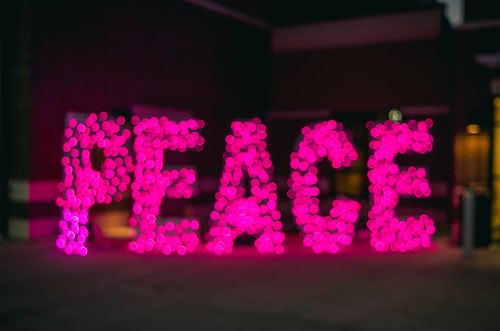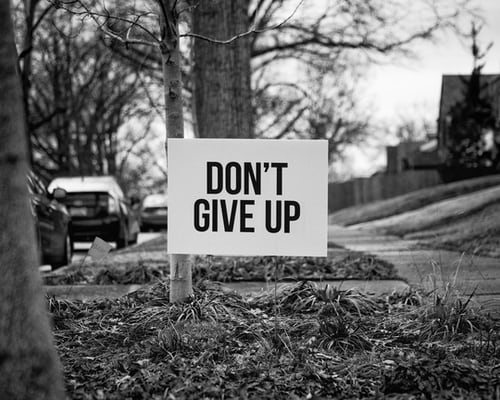Has life changed for you during this coronavirus pandemic and the lockdowns?
Will your life ever return to normal?
Should it?
All our lives have changed since this coronavirus pandemic started sweeping across the globe. Some of our lives have changed a little; some have changed dramatically. And some have been upended.
And the question on everyone’s mind is: where do we go from here?

Unanswered questions—
Although we’ve been bombarded with opinions, I’m not sure there’s a person alive—including scientists, business owners, or politicians—that know the answer to the question: where do we go from here?
The scientists have their hammer that bangs us on the head with curve flattening mandates, finding therapies, developing vaccines, and not returning to normal until all of that has been accomplished.
The economists’ hammer bangs on the stock market and fears of investors, businesses and nations and signs that economies are collapsing and might never be able to recover.
Fear. Fear. Fear.
When you instill fear, you control the masses.
When you’re afraid, you make decisions based on fear. And fear-driven decisions usually carry poor, or even catastrophic consequences.
We need to take a deep breath, stop watching and listening to media that thrive on villains and catastrophes, and do some serious thinking, praying, and planning.

What does the future hold?
There was a moment for many when they wondered if they’d experienced their all-is-lost moment. That point they knew without a shadow of a doubt that life was never going to be the same for them, or anyone else. They looked into the black hole of life’s future and saw, well, a black hole.
And today I’m going to ask a hard question. A question I’ve asked myself, and one my husband and I have been pondering.
Should our lives return to normal?
Your personal future—
I think we’re all thinking about our futures. What they hold and what they’ll look like. What we’ve lost. What we had and will have to give up.
And some of us are scared by the vision.
My husband’s company is already running the algorithms to discern whether the curve-flattening calculations lined up (I’ll let you know that answer later); and figuring out the best way to return the employees to a safe work environment.
They’re incorporating things like rolling starts, with some employees returning soon and others later. Right now my husband might not return to the physical plant for another 18 months.
And they’re looking at mandatory workplace practices like wearing masks, making sure employees can maintain safe (social) distances during work. Some people working on Mondays, Wednesdays and Fridays; others might work longer hours on Tuesdays and Thursdays.
They’ve been contact tracing—figuring out who a sick person has come in contact with during their work day, and testing his contacts—since the beginning, and that practice will likely continue.
While my husband is thrilled at the prospect of working from home for another 18 months, a lot of his co-workers are not. They’ve had enough of it, with their kids and spouses in the same house all day. They’re bored. They don’t know what to do with themselves.
My husband and I can, and can’t, understand that.
It seemed like a great time to connect with family. Of course, as a former home schooling family, we’re well aware of the obstacles, frustrations, and deep learning curve you transcend in the initial home school transition, being both teacher and parent, and keeping kids challenged, focused, entertained, learning, and reasonably happy.
So we empathize with everyone that got dropkicked into the paradigm.
As for me, I’ve been doing what I was doing prior to the stay-at-home orders: writing in isolation in my study, staring through my French doors and picture windows at the backyard wildlife and budding flowers for inspiration, and meeting with writing and Bible study groups on ZOOM.
Of course ZOOMing with your groups isn’t the same as meeting in person and sharing the energy of writing and critiquing, and hugging and listening, but there have been benefits to it.
For introverts, this lockdown thing has been a boon.
For extroverts whose spirits are shriveling from lack of personal and group contact, not so much.
But none of us want to be stuck in a life of failed dreams, regrets and fears.

Moving from fear to peace—
If you’re feeling overwhelmed by scary, all-over-the-map emotions, I want to help you move from fear to peace. From insecurity to security. From doubt to trust. From despair to fear.
When looking at your future, what do you see?
If we rephrase that, we can ask: what do I want and hope to see?
Because it really is about hope. Hope in our future. And while our futures may not look like we thought they were going to look at the beginning of the year, we can make sure they’re still full of hope and purpose.
When we take the current paradigm that in some ways looks like that big black yawning hole, or misty fog, we can re-work it to paint a picture. A lovely one that allows us to make the best of the days and times we have.
That allows us to look at these times as a gift to be enjoyed and treasured.
A time to ask the Lord what He’s preparing us for, and what we can learn while navigating the valleys.



An ancient story that gives tips for our present one—
Several thousand years ago, a little nation faced a similar, gargantuan challenge. More than a challenge, really. A devastating destruction of their homeland and their dreams and hopes for their future, businesses, and families.
It was the nation Israel, and God had decided to use an evil neighboring nation to discipline them. (Israel had fallen away from the promises they’d make to God about living the way He wanted them to. They were overrun with immoral behavior and unfair, deceitful business practices and had grown fat, arrogant hearts.)
I can imagine they thought their 70 years of captivity (3 generations) spelled a death knell for their nation, and for each of them personally. They were likely horrified, and terrified. Prospects for any kind of fruitful, enjoyable living looked bleak.
But God wasn’t blind or deaf to their pain, and He instructed His prophet Jeremiah to give some encouragement to these exiled people:
“Build houses and live in them; plant gardens and eat their produce. Take wives and have sons and daughters; take wives for your sons; and give your daughters in marriage; that they may bear sons and daughters; multiply there, and do not decrease. But seek the welfare of the city where I have sent you into exile, and pray to the LORD on its behalf, for in its welfare you will find your welfare” (Jer. 29:5-7).
I believe we can use this instruction as encouragement right now. Lift out the important directives and you have a list of positive, action-oriented words.
A to-do list for living, and multiplying, and prospering. Things you can build hope and a future on.
- Build
- Live
- Plant
- Eat
- Get married
- Encourage your kids to marry
- Have babies
- Encourage your kids to marry and have babies, to produce another generation
- Multiply
- DO NOT decrease.
- Seek the welfare of the city in which you’re living, (no matter what the circumstances).
- Pray to God on the city’s behalf, so
- You can enjoy the welfare the city enjoys.
God didn’t want His people to shrink back, stagnate, wallow in despair over what they lost and didn’t have, and disappear.
He wanted them to THRIVE.
And I think He’s calling us to do the very same right now, in the midst of the dire warnings, the fears, the hammer slinging and smashing.
He doesn’t want us to shrink back, stagnate, or wallow in despair over what we’ve lost and might not regain.
So whom will you heed?
The fear-mongers?
Or the God who loves and gives and guides and directs?
No matter how long this pandemic goes on, I’m fairly certain God wants you to settle in, raise your family, be fruitful, be a valuable member of your community, and prosper!

Confronting realities—
I know many of us will have tremendous difficulties regrouping and planning futures. They may take some time to re-establish.
For others, we feel as though we were living the good life, minding our business and then abruptly flattened on the sidewalk of life. Unable to peel ourselves off the pavement and keep going. We’ve lost our jobs, our paychecks, our resources.
Or we’ve had to say goodbye to family members through remote funerals.
Some of it seems too overwhelming to confront or think about.
In order to emerge from the mess, right our family’s life and us, and build, multiply and prosper, it may take time.
But what better time than now to take stock of our time and our talents, pray for guidance, and formulate new plans? To build and architect hopes for a new future.
As author Dr. Jeff Meyers says in his new book Unanswered Questions, we are “no more than one heartbeat away from eternity.”
And that’s true for all of us.
And because of that, each day—each moment—should be regarded and treated as a gift. As Dr. Meyers emphasizes, it will “change the way we think about God, other people, and, well, everything.”
With Christ in your heart and at the helm of your life and thoughts, meaning will emerge out of fear, hopelessness and emptiness.


The future—
A recent ministry newsletter I received pointed out that in the best-case scenario, there will likely be genuine and serious challenges for many of us as a result of what happened.
And even in the worst-case scenario, our God and King is still in control, and our hope has ever been in Him, not in the situations and circumstances of this world.*
And they highlighted one of my favorite Bible verses; one I’ve leaned on innumerable times in scary situations:
“Be strong and of good courage; do not be afraid, nor be dismayed, for the LORD your God is with you wherever you go.” Joshua 1:9

Those algorithm results—
So what did data experts in my husband’s company discover from examining the infamous modeling we’ve heard and seen in numerous news reports?
That the curve flattening data and numbers didn’t weren’t lining up. The results weren’t validating the projections.
But does that really matter now that businesses and jobs are lost, that lives are in shambles, and life has been drastically altered?
We can’t rewind the clock three months and request a do-over. We need to take what we’ve been given today and make the most of it.
We need to ask: Where do we go from here? What do we need? What do our family, city, state and nation need? And how can we contribute to those needs?
The sooner we ask and answer these questions, the better off we’ll be, and the better headed in the right direction to rebuild our futures. And to prosper in them.

Invitation—
I invite you to ask yourself some of the same questions my family and I are exploring.
- What does my life look like now, and what would I want it to look like next month, by year’s end? Next year?
- Given my circumstances right now, how can I achieve that vision? (And how could I change my circumstances to make the achievement more likely?)
- What research do I need to do, what counselors do I need to seek out to help me achieve those goals and make that vision vivid and real?
- How can we build, plant, eat, multiply, bless, pray and contribute to prosperity so we can all prosper? (Have a brainstorming session and write down ideas. Don’t be afraid to dream, like you did when you were a kid. And don’t knock any ideas you write down. You can evaluate them in a few days or weeks to decide which ones are most important to you and doable.)
- If I have the time (and health), whom can I help or volunteer with? If I have the financial resources, whom can I support or lift up with my resources?
- Is there anything good I experienced during the lockdown that I would like to continue in the future?
NEXT WEEK: We’ve all had some dreams fritter away, abruptly evaporate, or be put on hold due to COVID-19 and the lockdowns. Rather than ignore them, it’s important to identify and validate the emotions this life-altering pandemic has unleashed. And grieve losses of all types.
I’ll be giving you tips for accepting and being comfortable with those emotions and grieving those losses.
You won’t want to miss this valuable post!
Until then,
pray, plan, build, multiply, bless, and prosper.
Andrea

Andrea Arthur Owan, M.S., A.T., R., is a fitness pro, chaplain, and award-winning inspirational writer. She works and writes to help people recover from grief and loss and to live their best lives — physically, emotionally, and spiritually.
*Jews for Jesus April newsletter

